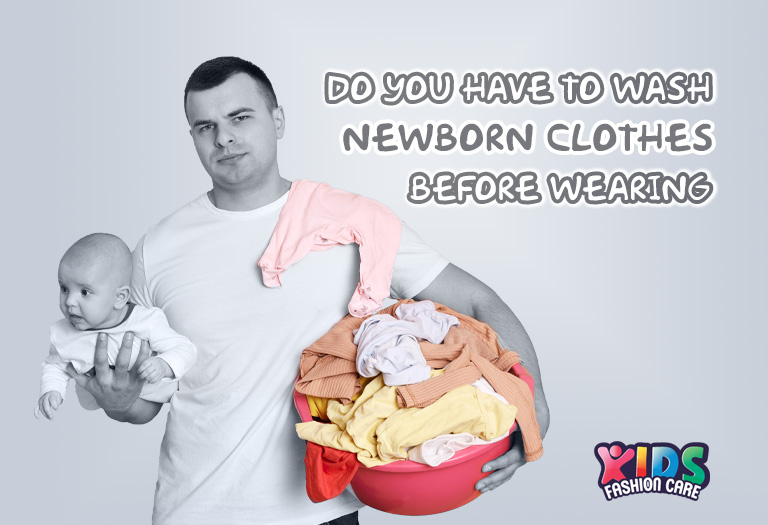Washing newborn clothes before use is essential to protect your baby’s sensitive skin from chemicals, allergens, and irritants. This guide explains why pre-washing matters, offers step-by-step instructions for washing baby clothes, and provides tips for eco-friendly laundry practices. Learn how to choose the right detergent, avoid common mistakes, and store clothes properly to keep your newborn safe and comfortable.
Table of Contents
I hear you are a newborn parent. In that case, firstly, a big congratulations to you and your other half. But not that you are a parent. You need to start really thinking about certain things more thoroughly. For example, do you have to wash newborn clothes before wearing them? Yes, you must wash your newborn’s clothes before your newborn wears them. This is to to protect your baby’s sensitive skin from chemicals, allergens, and irritants.
We will also discuss how you should clean newborn clothes and some common mistakes new parents make. By the end, you are sure to be confident in this one, but it is a major area that new parents have to tackle. So, let’s get to washing those newborn clothes.
Why Washing Newborn Clothes Matters?
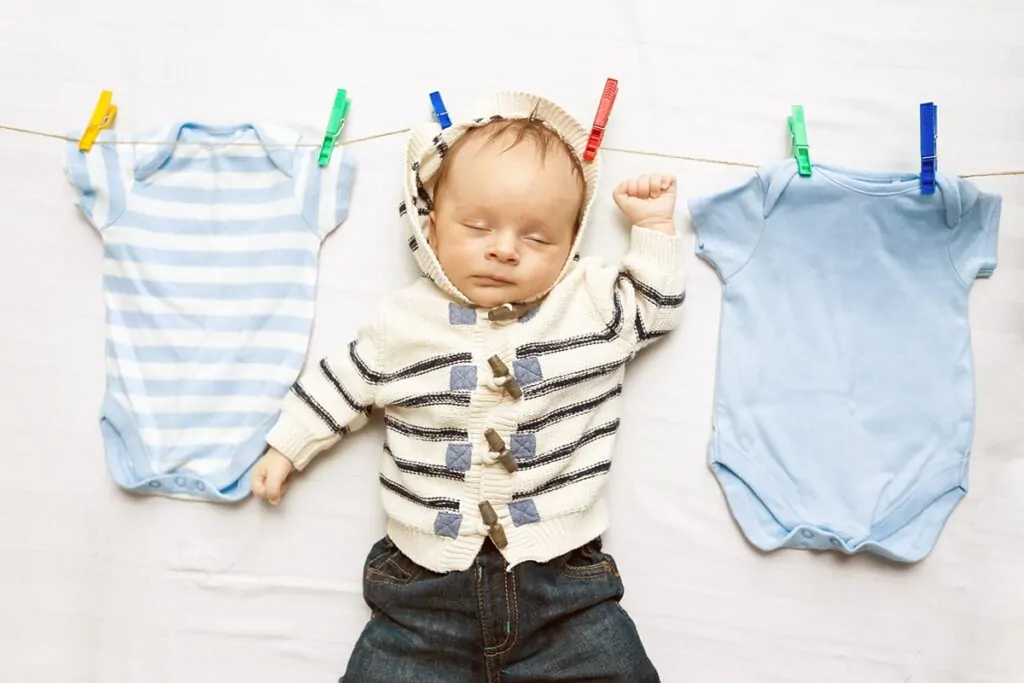
You wash newborn clothes before wearing them because there are multiple health concerns if not done. We will look at these concerns and go into detail to ensure you understand why you must wash newborn clothes before the baby wears them.
Removing Chemical Residues
The most obvious reason for washing newborns’ clothes is to remove the chemicals left on them before they are packaged and stored. Apparel manufacturers use various chemicals to wash and package their clothing before shipping it to ensure it remains undamaged. While these chemicals might not affect adults, this isn’t true in the case of newborns.
Therefore, it’s essential to ensure your newborn’s clothes are cleaned properly to not harm them. Proper cleaning must be followed to ensure your newborn doesn’t suffer from rashes and other such effects.
Specific chemicals you might need to be aware of are:
- Formaldehyde: Used to prevent wrinkles and shrinkage.
- Azo Dyes: Used in fabric coloring.
- Chlorine Bleach Residue: Used for whitening fabrics.
- Heavy Metals (Lead, Cadmium, Mercury): Found in some fabric dyes and accessories.
Eliminating Dust and Allergens
Other than removing fabric chemicals by washing newborn clothes before wearing them, you need to do this to remove dust and allergens as well. As a newborn, your child is very weak to foreign sources, especially the microscopic ones. This is because your child’s immune system is practically brand new. So, you need to clean and remove any substance from their clothes that they will be weak to, such as chemicals and allergens.
The cleaner and more sterile you can ensure your newborn’s clothing is through cleaning, the safer they will be on their sensitive skin. While it’s true no amount of cleaning will ever make them completely safe, you can still make it safe enough.
Softening Fabrics
The new in newborn doesn’t just pertain to their internal organs. It also concerns their external organs as well. In particular, the newborn skin is especially sensitive to new sensations. Newborn clothes fresh out of the packaging will have a rougher texture, which feels very irritating to the babies. This is because their skin acts as a sensory organ fresh out of the womb. That means it’s highly sensitive to any sensations, which is all of them in their case.
Parents are told to wash their newborns’ clothing before putting them on. The washing act will make the clothes feel softer than before, thus making them feel less irritating to their newborn skin.
Preventing Skin Irritation
Connecting with the previous point, skin irritation happens very often in newborns. All babies are prone to skin issues such as eczema or diaper rash. To ensure your newborn doesn’t suffer from such an issue, you need to wash the clothes they wear.
By washing them, you will remove most of the irritants, therefore reducing the frequency of these skin issues. But like we said, they happen often, so all you will do is lower the number of times it will happen. Trust us; this will be more than enough reason to be happy.
How to Wash Newborn Clothes: A Helpful Guide
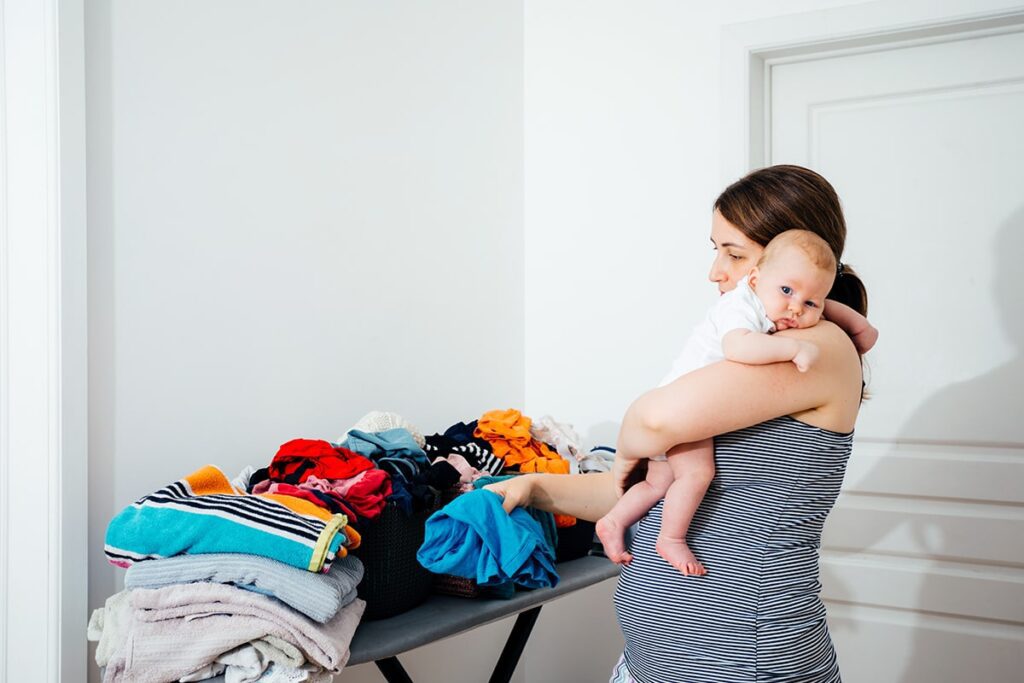
Now that you know why you must wash newborn clothes before wearing them, it’s time to talk about the how. As in, how to wash newborn clothes the right way. Here is how:
Choosing the Right Detergent
Before you do any cleaning, you must pick out the right detergent to clean your newborns’ clothes. If you think you can use your regular cleaning agent, then you are deadly wrong. Newborn clothing requires more delicate and chemically safe cleaning solutions. Here are the key features you need to look for:
- Hypoallergenic and fragrance-free: This is the most important one and for obvious reasons. No harmful chemicals must come close to your newborn’s skin.
- Dye-free: Like before, the cleaning agent must be free of dyes that may cause skin irritation.
- Gentle formulas: Newborns are delicate, so their detergent must be.
We recommend Dreft, Seventh Generation, and All Free & Clear brands as they meet these criteria.
Sorting and Preparing Clothes
Once you have sorted the newborn detergent issue, it’s time to sort their clothes and get them ready for cleaning. How to do this? Glad you asked. Here is how:
- Color sorting: Separate the clothing by its color. Wash the lighter-colored ones before or after the darker-toned ones.
- Check for tags and loose threads: Remove the clothes with tags or loose threads for better results.
- Sorting by stains: Pre-treat clothes with stains and remove them once they are washed. We recommend the baking soda and water treatment process.
Washing and Drying Tips
Washing and drying newborn clothes before wearing them are connected for obvious reasons. Here are some tips we recommend you follow for the best results:
- Use warm water: Warm water is best at removing dirt and residues more effectively.
- Gentle wash cycle: Only use a gentle wash cycle since newborn clothes tend to be more delicate.
- No fabric softener: Most commercial fabric softeners have chemicals that are either harmful or irritating for newborns.
- Air-dry: A dryer for newborn clothing isn’t recommended as it might damage or shrink them.
While we might not have provided a step-by-step guide, these tips should be more than helpful enough to help you wash newborn clothes.
Common Mistakes to Avoid When Washing Newborn Clothes
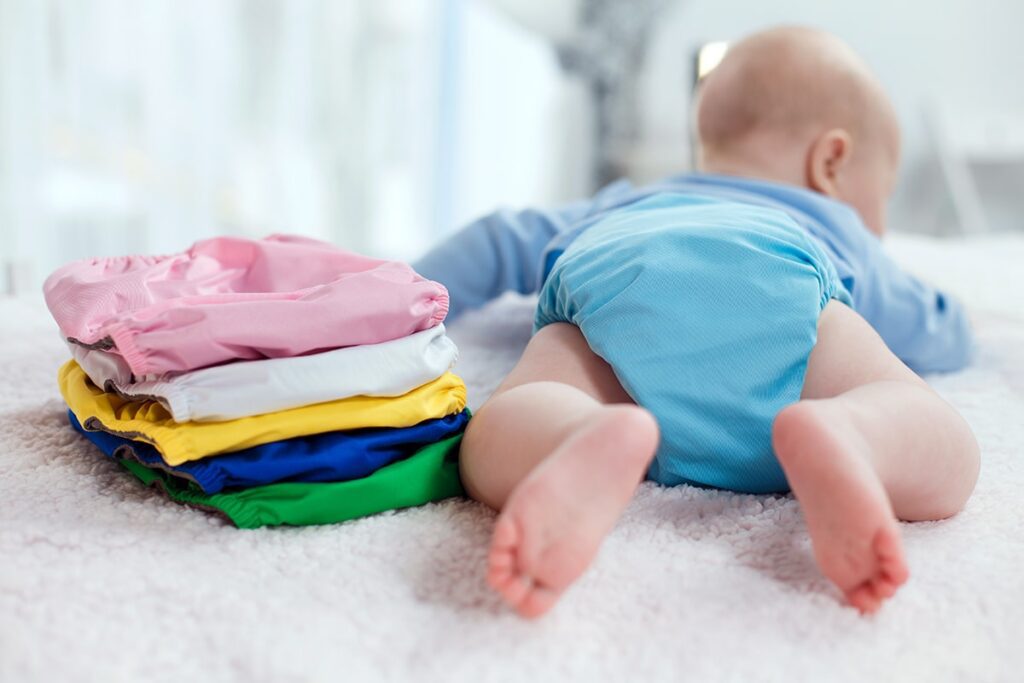
With our guide on how to wash newborn clothes before wearing them, it’s time we went over the mistakes some people make. These aren’t mistakes that just happen. They happen because people don’t have the right information. So here are some common mistakes to avoid while you wash your newborn’s clothes before wearing them:
Overloading The Washing Machine
The first and one of the most obvious mistakes to avoid while washing newborn clothes is never overloading the washing machine. As you will find out, newborn clothes are really delicate; thus, they can tear quite easily if washed roughly. An overloaded washing machine will do just that: wash the clothes roughly because it’s too packed.
Also, when the machine is too packed, the cleaning solution will not be distributed evenly. This means your newborn clothes won’t be properly cleaned; thus, the whole process would be a waste of time.
So you should put less than a full load, closer to half a load of clothes, into the machine when you are washing newborn clothes. Also, only wash newborn clothes together. Don’t mix in other clothes.
Using Harsh Detergents or Fabric Softeners
Too many new parents make the mistake of washing their newborn’s clothes using basic or over-the-counter detergents and fabric softeners. This is quite a mistake to be making since those things have chemicals in them that can harm your newborn. Chemicals such as formaldehyde and chlorine bleach solution can irritate and cause rashes and such to form on your newborns’ skin.
Also, these chemicals like to stick around even after they are washed by water. So, you can never be sure the chemicals have been removed once the clothes are cleaned. Instead of taking such a risk, we recommend you wash newborn clothes before wearing them with hypoallergenic, fragrance-free detergents. There are many brands out there that market themselves as safe for newborns and babies. While some might be false advertising, others aren’t. Dreft, Seventh Generation, and All Free & Clear are some brands we believe are safe for newborns and babies.
Ignoring Care Labels
Newborn clothes that are manufactured nowadays come with care labels. These labels inform the buyers and parents on how they should be treated, washed, and stored. Many new parents ignore these labels, which results in their clothes becoming worn out much faster than they should have. Ignoring these labels can and will lead to shrinking, fading, or damage to the clothes.
We suggest that parents take the extra few seconds to read the labels of their brand-new clothes. Afterward, follow the instructions printed on them. This can and will lead to these clothes lasting longer and being in good condition.
Using High Heat for Drying
Taking care of a newborn is a challenge unlike any other, and we know parents of newborns all look for ways to save time. One such way we know of is by using high-heat dryers to dry out newborn clothes. But we suggest that you don’t do that anymore.
Excessive heat leads to newborn clothes drying out too quickly, thus shrinking in size. Instead, the better option would be to air-dry them. Yes, it will take longer, but it will dry out naturally without damaging the clothes, thus making them last longer.
Skipping The Pre-Wash Step for Hand-Me-Downs
Using hand-me-downs and secondhand clothes is a wonderful idea because you save money and be environmentally conscious. However, parents of newborns forget that these clothes have been stored for a long time in some cases. This means that the clothes might be full of dust, allergens, or germs from storage.
So you can’t have your newborn wearing them without them being pre-washed. If you do have them worn without washing, you run the very possible risk of exposing your baby to these irritants.
What About Hand-me-downs and Secondhand Clothes?
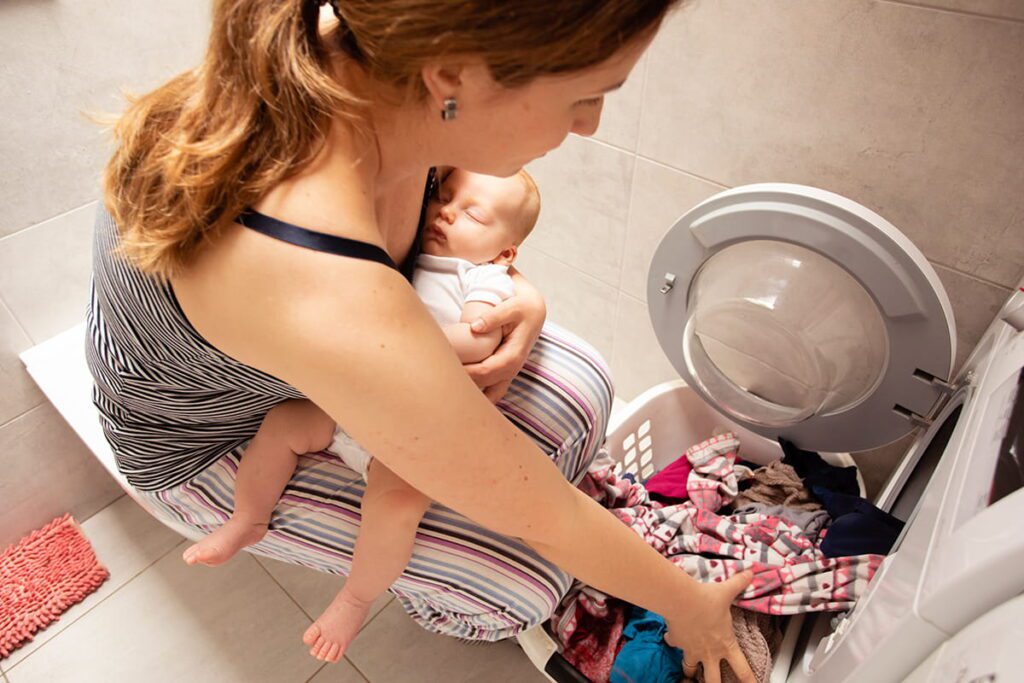
As we just mentioned, hand-me-downs and secondhand newborn clothes can be ideal for your newborn. But you need to ensure they are properly washed and stored. How do you do that? Here is how:
- Inspect them: Before you do anything, inspect the newborn clothes you have in hand. If there is any sign of wear and tear, you need to either drop them or have them repaired. These things can be a hazard for your newborn.
- Sanitize them: Once you have picked the best of the bunch, wash and sterilize them. You don’t know where these clothes might have been. So better safe than sorry, as we say.
- Remove stains: Before, during, or after the clothes have been cleaned, you might have to remove some stains. Pre-treat stains with a baby-safe stain remover or a baking soda and water paste. Either will do.
How Often Should You Wash Newborn Clothes?
Now, this is a question we have been asked a lot. Every new parent asks them, and they should. This is because the question of whether you have to wash newborn clothes before wearing them frequently doesn’t have a single answer. Instead, it depends on certain factors. So here is a more detailed answer for new parents.
- Daily use: If you have certain clothes or items, such as onesies, socks, and bibs, that are used daily, you must wash them daily or after every use. These clothes are more likely to transfer any bacteria they catch. Since they are in direct contact with the newborn.
- Less frequent use: On the other hand, items like blankets, hats, and outerwear that are used less frequently can be washed weekly. The reason is that they aren’t worn or used daily, so there is less chance of transferring any bacteria.
- Minor stains: With stains and spills, full cleaning isn’t necessary if it’s a minor one. Baby-safe stain remover or a damp cloth and soap should be used for spot cleaning. This ensures the items last longer.
- New clothes: All new newborn clothes must be washed thoroughly because of chemical residues, dust, and allergens. Please do not take chances with basic cleaning; instead, follow our how-to-wash newborn clothes before wearing the tips above.
Storing Newborn Clothes After Washing
Once you have properly washed newborn clothes before wearing them, you must also store them properly. How, might you ask? Here is how in four simple steps:
- Use clean, dry storage bins: Don’t just throw the washed clothes into the storage. Instead, they should be put in storage bins to keep them free from dust and moisture. Avoid the plastic ones because they attract pests and absorb odors.
- Organize by size and season: Organize your newborn clothes by size, season, or something else. This makes keeping track of them and finding them later much easier. Use labels if you are like us and forgot things.
- No overcrowding: Don’t just pack the clothes in because you don’t want to waste space. Leave some space to allow the clothes to breathe and be wrinkle-free. Also, crowding the clothes will make something specific much harder.
- Vacuum-sealed bags for long-term storage: If you are storing certain clothes for a long time, usually seasonal clothes, then use vacuum-sealed bags. They save space and protect clothes from dust, moisture, and pests.
Eco-Friendly Tips for Washing Newborn Clothes
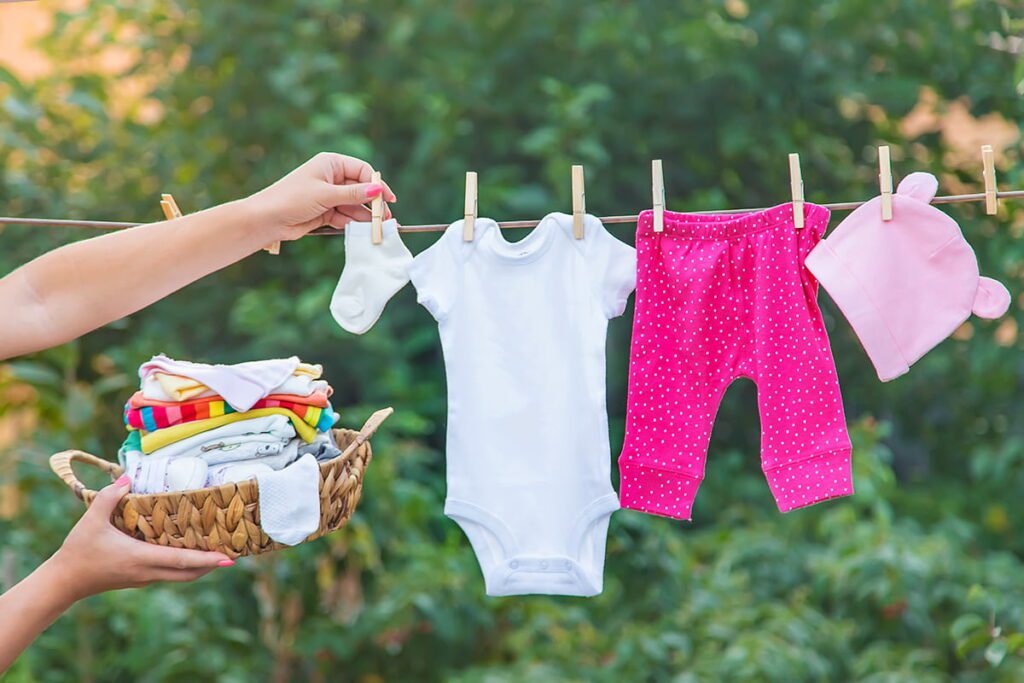
Being eco-friendly doesn’t have to mean it’s something posh; you can care about our planet and still save money. Buy eco-friendly, biodegradable detergents. We suggest brands like Seventh Generation and Ecover. They are affordable and still made with earth-friendly biodegradable materials. Wash your clothes in cold water to save the planet and reduce your electric bill. Air-dry clothes instead of using an electric dryer for the same reasons.
Use baking soda, lemon juice, or white vinegar instead of chemical stain removers. Don’t throw away newborn clothes once your baby grows up. Instead, they should be gifted as secondhand clothing to others or to charities. You could also DIY them into cleaning rags, quilts, or toys.
These are just a few ways you can do your part as a parent and lover of our planet to ensure your child has a bright future.
Frequently Asked Questions (FAQs)
Can I use regular detergent for newborn clothes?
Regular detergents often contain harsh chemicals and fragrances that can irritate a baby’s sensitive skin. It’s best to use a hypoallergenic, fragrance-free detergent specifically designed for babies.
How many times should I wash newborn clothes before use?
Washing new clothes once is usually sufficient to remove chemical residues and allergens. However, if your baby has sensitive skin or allergies, you may want to wash them twice for extra precaution.
Should I wash baby blankets and bedding the same way?
Baby blankets and bedding should be washed using the same gentle detergent and techniques as clothes. Be sure to check the care label for specific instructions.
What if my newborn has sensitive skin or allergies?
For babies with sensitive skin or allergies, take extra precautions:
1. Use a fragrance-free, dye-free detergent.
2. Rinse clothes twice to ensure all detergent residues are removed.
3. Avoid using fabric softeners or dryer sheets.
Conclusion
In conclusion, you must wash newborn clothes before wearing them for health reasons. Newborn clothes fresh out of the bag have chemicals, allergens, and irritants on them from long storage. These chemicals are known to cause health problems for newborns, such as rashes and other kinds of skin irritations.
Using the tips we have shared, you should have an easy time washing your newborns’ clothes. Remember to take your time and follow the guidelines we have shared so you can ensure your newborn will feel comfortable in their new clothes.
Clothes that have been washed will also need to be stored properly if they aren’t worn. How you store them matters, so follow our storage guide for an easier time. Enjoy the process and cherish the moments as you welcome your baby into the world!

